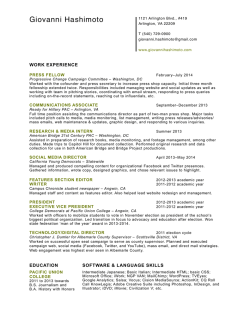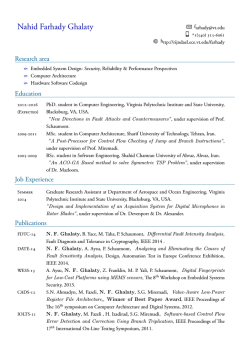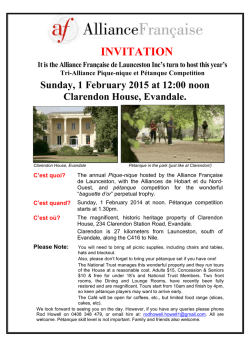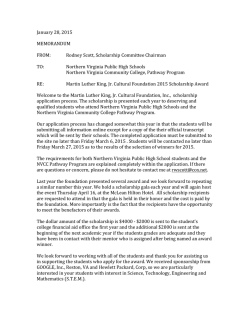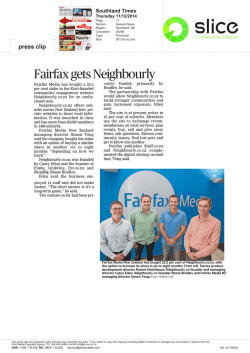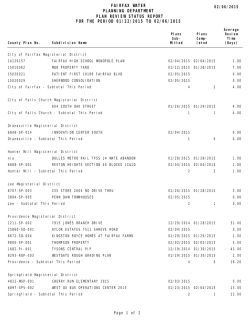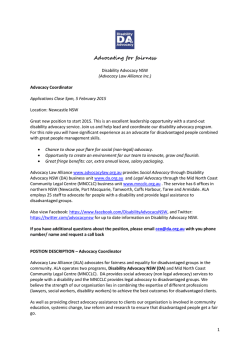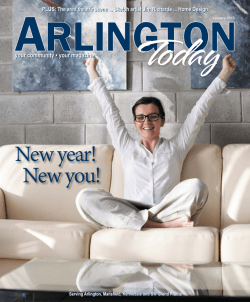
February newsletter - ENDependence Center of Northern Virginia, Inc.
FEBR U AR Y 2015 Declaration The Advocacy Issue Remembering Bill Ward In this issue: By Brianna Gross, Communications Manager Meet the New ECNV Board Members 3 Self-Advocacy: What It Is, Becoming Better at It, and Honing Your Skills for Maximum Effectiveness 4 Five Common Advocacy Opportunities 6 February Calendar 7 Find out about sponsorship opportunities for our Annual Awards Reception! More info on page 6. Bill Ward, Director of Loudoun ENDependence (LEND), passed away on December 29, 2014. Loudoun County and the regional disability community have lost a great advocate, friend, and colleague. Mr. Ward, who was paralyzed from the neck down in a body surfing accident three decades ago, became a tireless advocate for people with disabilities in Northern Virginia. In the mid-1990s he approached the Executive Director of the ENDependence Center of Northern Virginia (ECNV), Michael Cooper, about increasing services for people with disabilities in his home of Prince William County, Manassas. Mr. Ward began working part-time for ECNV to serve more people in Prince William County, but he wanted to do more. Working tirelessly with a team of ECNV staff, Center for Independent Living (CIL) advocates from across Virginia, as well as state legislators, he secured funding to create a new CIL, the now thriving Independence Empowerment Center (IEC), established in Manassas in 1999. Mr. Ward was hired as the first Executive Director. Having left IEC for health reasons in 2005, he was recruited by ECNV in 2008 to launch another satellite office in Loudoun, and was the Director there until his death. (Continued on page 5) Make Your Voice Heard By Alexa Mavroidis, Peer Mentor For many people, with or without disabilities, the prospect of advocating for themselves is scary or uncomfortable. Some of us are shy or quiet. Others might be used to having people in our lives, like a parent, family member, friend, or support professional get what we need for us. But most, if not all of us, eventually reach a point where even the most thoughtful and supportive advocate doesn’t quite know what we want or need and we have to speak up for ourselves. By advocating for ourselves, we not only gain confidence but show that we are competent and able to run our own lives. As a Peer Mentor at ECNV, one of the many things I do is help to advocate for our consumers – and the most important way I can do that is help people to advocate for themselves. (Continued on page 2) The ECNV October Declaration 2014 February 2015 Page 3 Page Page 2 2 Make Your Voice Heard (continued) ECNV helped one of our consumers move from a nursing home into her own apartment with the assistance of a housing voucher program in Fairfax County. That voucher program was later merged into a larger program, and we were concerned that our consumers wouldn’t be able to access those vouchers. Our Advocacy Director, Doris Ray, and I asked this consumer if she would be willing to testify at a County hearing about the difference the voucher made in her life. We visited her in her apartment and helped her to understand the issue and to practice what she wanted to say. By advocating for ourselves, we not only gain confidence but show that we are competent and Unfortunately, I came down with the flu the night of the hearing and couldn’t watch her testify. But I’ve heard many times since that her testimony was powerful, and soon after she made it, they started taking referrals again. Nothing anyone from ECNV could have said would have had the same impact as a person speaking for herself about what she needed. able to run our own lives. Sometimes, all people need is a reminder that the things they have to say are important and that they deserve to be listened to. I help consumers figure out what they want to say by talking through the different facets of their problem and discuss what they want to ask for and how they might do that. I also give people the space to rehearse the things they want to say – to learn how to “speak their mind, though their voice shakes.” They can practice telling me – a person who is on their side and cares about their needs – before they go in front of someone who they fear or know is predisposed to tell them no. Some people need help coming up with a strategy to successfully convince people to give them what they’re looking for. In those cases, I offer advice based on my own perspective and experiences. ECNV’s ultimate goal is for every person to discover his or her voice and realize it is worth hearing. Independent living philosophy states that people with disabilities know what is best for us. When we speak for ourselves, we take ownership of what we want and need and take responsibility for ourselves. Even if we need a little support, we can make the changes we need in our lives without relying on someone else to do it for us. For assistance with self-advocacy, contact Director of Advocacy Doris Ray, at (703) 673-4489 or [email protected], or contact ECNV Peer Mentor Alexa Mavroidis, at (703) 673-4494 or [email protected]. Question of the Month For this issue’s Question of the Month, we asked the staff at ECNV to tell us about their ideal Valentine’s Day gift. Here is what they said... “A day full of surprise adventures all planned by my boyfriend—a hot air balloon ride, going to the movies, a home-made dinner, a hike, seeing a play, catching some music, or a trip to Hawaii. One or all of the previous ideas could work. Oh, and flowers would be nice, too.” Hannah Manila, Medicaid Programs Coordinator “A dinner with someone and a glass of wine. Spend some quality time with those you love and make that day very special.” Ruchika Lalwani, Administrative Assistant / Medicaid Billing Specialist/ PAS Coordinator “A lovely dinner for two at my favorite southern home cooking restaurant, Dixie Bones, followed by a trip to the circus. Good food, good fun, good company. I couldn’t ask for a better treat.” Cynthia Evans, Director of Community Services “Any thoughtful surprise! A puppy would be nice.” Brianna Gross, Communications Manager Join the conversation! Follow us on Twitter or like us on Facebook to find out the Question of the Month and you could be featured in the ECNV Declaration! Follow us on Twitter @ECNVorg www.twitter.com/ ECNVorg Like us on Facebook www.facebook.com/ ECNVCIL The ECNV Declaration Page 3 Meet the New ECNV Board Members Soula Antoniou, President & CEO of Antoniou Consulting, has a proven record of success as a visionary, advocate, and spokesperson. Ms. Antoniou has an extensive portfolio and has worked with clients including the ENDependence Center of Northern Virginia (ECNV). Recruited as Interim CEO by the Board of Directors to provide strategic leadership in 2012, she spearheaded a national executive search, installed a permanent CEO and facilitated a successful transition process. ECNV Board of Directors Lee Page President Soula Antoniou Vice President Helena R. Berger Treasurer Tiffany Joslyn Secretary Prior to launching Antoniou Consulting, Ms. Antoniou served as President of VSA, the international organization on arts and disability, an affiliate of the John F. Kennedy Center for the Performing Arts, for eight years. Ms. Antoniou launched groundbreaking initiatives and cultivated new affiliates throughout the United States and in 51 countries. Under her leadership, annual participation in VSA's programs significantly increased to over seven million people. Ms. Antoniou raised over $100 million by diversifying revenue streams, attracting new corporate sponsors, foundation and government support and major donors, resulting in a $2 million reserve and the best financial position in VSA’s history. Maya Flores Karina Jeronimides Erica Midboe Julie Nepveu William Staderman Ms. Antoniou created opportunities for artists to perform and exhibit in leading institutions such as the Smithsonian and the Kennedy Center. She produced professional development forums in locations from Hong Kong to Cairo and commissioned a new body of work for mainstream audiences. The International Festival on Arts & Disability brought together over 2,000 participants from 67 countries and featured 47 events in 14 venues, making it the largest arts and disability festival in the world. Community Services Cynthia Evans Director Prior to joining VSA, she was in senior management at the Massachusetts Office of Disability, where she chartered a new course of sound financial and operational practices and worked on public policy issues including the Americans with Disabilities Act. Ms. Antoniou serves on several boards including ECNV, Happy on Wheels, and the Board of Visitors of Children’s National Health System. Tiffany Joslyn is an attorney serving as Counsel for White Collar Crime Policy at the National Association of Criminal Defense Lawyers (NACDL). In this capacity, she tracks and analyzes criminal legislation in order to prevent overcriminalization, overfederalization, and the further erosion of mens rea, and works on various advocacy and education initiatives in these areas and criminal justice reform generally. Ms. Joslyn has conducted intensive analytic research and authored papers and articles on criminal justice issues. She regularly collaborates with an ideologically diverse coalition of organizations in support of a bipartisan reform agenda. Prior to joining NACDL, Ms. Joslyn clerked for the Honorable John R. Fisher of the District of Columbia Court of Appeals. She graduated with honors from George Washington University Law School, summa cum laude from Clark University, and from the Sorensen Institute for Political Leadership at the University of Virginia. An Arlington resident, Ms. Joslyn serves in various community leadership roles, including as a Commissioner for the Arlington Human Rights Commission and President of the Arlington Gay & Lesbian Alliance (AGLA). She also volunteers for the District of Columbia Bar Association Lawyer Assistance Program and is a past president of the Virginia Partisans, the PAC of the LGBT Democrats of Virginia. ECNV Staff Brewster Thackeray Executive Director Selvin Garcia Brianna Gross Alexa Mavroidis Andrew Shaw Medicaid Programs Layo Oyewole Director Rachel Henry Hannah Manila Jennifer Reese Advocacy Doris Ray Director Accounting Jorge Pineda Administrative Ruchika Lalwani Douglas Zak LEND Office Tracee Garner Jennifer Reese ECNV Project Contractors Amy McPherson Ed Weiss February 2015 Page 4 Self-Advocacy: What It Is, Becoming Better at It, and Honing Your Skills for Maximum Effectiveness By Tracee L. Garner, Outreach Coordinator I remember as a child watching my parents speak for me in my many parent-teacher conferences, Individualized Education Program (IEP) meetings, and virtually any situation where my parents had to raise their voice on my behalf. This was especially interesting for me in elementary school when my dad often came to school to tell the teachers that I should be in a certain class that matched my intellectual ability instead of where they thought I should be (plus little did he know I often limited showing my abilities just so I wouldn’t have to do any real work). He would often receive push back, frowns, and a less than amicable response. Fortunately for me, that push back never lasted long because my father could be very intimidating, not to mention he was a great speaker. He always got what he thought was right for me and I excelled being with my peers. My father’s early example allowed me to understand what self-advocacy really means. My mother or father spoke up for me only to a point, and then they would look at me pointedly, silently telling me that it was time for me to speak for myself. They very well could have continued to speak for me, to fight my battles and to say what they thought was best, but that wasn’t self-advocacy nor was it empowering. For them to continue to assist me would only make me dependent on them for help each and every time I came to a situation where I wasn’t sure how to go about getting what I needed. Because I loved reading and words, self-advocating began to come naturally, but not everyone likes speaking up. Self-advocacy isn’t only through the spoken form; it can still be effective when written through a letter, when given through demonstration in a group, or even just showing up and offering input. Whatever method you choose, good self-advocates are best received when they take time to do the following: Research – A good self-advocate prepares by finding out ahead of time what topics will be addressed. Make it personal – An honest, personal story is a great way to make someone understand your position. Ask, what will happen to my life if a program is cut, if I am not allowed to choose, if those around me go against my wishes and desires? Is this my right under the law? Briefly talk about how you (and others) are affected. Clearly state the solution – It is easy to go on and on about how something affects us, how bad it would be if this or that happens, but clearly stating the solution is paramount. Explain exactly what needs to be done and how your audience can take action. Be concise and considerate – Be aware of the time you are taking to make your case. You never want people to groan when they see you coming. Get in, make your point and exit gracefully. Practice makes perfect – Use notes, bullet points or even tape yourself speaking to help yourself improve. Have a friend listen while you practice to give you any pointers. Or, if you are writing, have someone look over your draft before you send it. Always say “thank you” – When things go your way — and even when they don’t — you always want to thank those in a position of power for taking time to listen to your concerns. Chances are you may come before them again with the same issues and you want your advocacy to always be a pleasant experience for all involved. Self-advocacy is never ending. We all need to continue to advocate throughout our lives, for ourselves, our children, our aging parents, and those we care about. The better you are at advocating for yourself, the better you will be able to advocate for others. Keep speaking up for yourself; it’s the only way things are going to change. Let ECNV know if we can be of assistance. Your empowerment is our mission. The ECNV Declaration Page 5 Remembering Bill Ward (continued) “Bill was a can-do guy, a systems-change kind of guy. But he was never about receiving credit. He just wanted to ensure people with disabilities have access to the tools they need to live independently and he made it happen,” said Mr. Cooper, who was Executive Director of ECNV from 1995 to 2006. As the Director at LEND, Mr. Ward did everything from peer mentoring to advocacy. He advocated for issues such as affordable, accessible housing, transportation, employment, and access to healthcare. One of his major successes at LEND was advocating for Loudoun County Transit to run to 10:00 p.m. Mondays through Fridays instead of 7:00 p.m. Mr. Ward was also an expert at securing funding. He helped LEND get their first grant from the Loudoun Regional Organizations budget. LEND has been written into the budget ever since. “No longer having Bill’s energy, knowledge, and unwavering commitment to the independent living movement is a huge loss for ECNV and LEND,” said ECNV’s current Executive Director, Brewster Thackeray. “His passion and dedication will continue to motivate and inspire our work going forward.” Mr. Ward also served on the Virginia State Rehabilitation Council, the Prince William County Disability Services Board, and the Virginia Statewide Independent Living Council. He was awarded the ECNV Independent Living Award in 2007 for his dedication to the independent living movement. Bill Ward was an active member of his community. Using his chin to maneuver his electric wheelchair, he traveled all over the state of Virginia to attend meetings and advocate for people with disabilities. He advocated effectively for public transportation for people with disabilities and frequently used it himself. “What I always admired about Bill was his determination,” said David Burds, Executive Director of ECNV from 2007 to 2012. “I could always count on him. I don’t use the term “inspiration” lightly, but he was an inspiration to me, and so many other people.” Bill Ward is survived by his wife Beth, daughter Gretchen, mother Claudette, and by his six brothers and sisters and many nieces and nephews. Contributions in Bill’s memory may be made, per his family’s suggestion, to: ECNV, 2300 Clarendon Blvd., Arlington, VA, 22201; or at www.ecnv.org. EXCEL! Networking Group Interviewing Workshop Articulating your skills Explaining gaps in work history Answering the tough questions and much more! February 19, 2015 1:00 p.m. — 3:00 p.m. ECNV, 2300 Clarendon Blvd., Arlington, VA RSVP with accommodations: [email protected] February 2015 Page 6 Five Common Advocacy Opportunities By Brianna Gross, Communications Manager Perhaps you don’t think you want or need to advocate for anything. At ECNV we realize being an advocate is not always on an individual’s to-do list. As food for thought, however, we’ve listed some of the most common and overlooked advocacy opportunities: 1) When your rights are violated. The most important part of being an advocate is to know your rights. If you know your rights, you can advocate for yourself or another in almost any situation, such as when a bus driver refuses to lower the ramp for you, or if a restaurant doesn’t let you bring your service dog inside. The most important legislation for people with disabilities to know is the Americans with Disabilities Act (ADA). You can find the complete text and helpful information about the ADA at www.ada.gov. 2) When the media is covering a topic that is important to you. See something in the paper that you feel strongly about? Write about it! Letters to the editor are short (only about 150-200 words) but a powerful way to get your idea across. Be sure that you cite the article you are responding to and submit it shortly after the original was published. If you submit your letter too late, it will not be current and the newspaper will be less likely to pick it up. Find out your newspaper’s guidelines for submissions before writing and don’t be discouraged if it doesn’t get chosen. Try again! Radio and TV news programs also offer places for public comment such as online forums, Twitter, and Facebook. An advantage to many media outlets is the ability to remain anonymous if you choose. 3) When local legislation or policies may affect you or your community. One of the best ways that you can influence policy is by going to your local government meetings. Your local government’s website will have a calendar of all public meetings. If you are interested in a specific issue like disability, transportation, or housing, then attend advisory group or commission meetings. These are smaller committees that focus on one particular issue. 4) When federal or state laws or regulations are being proposed. Is there a bill in congress that you support or oppose? Call your legislator and tell them! Legislators keep tallies of how many constituents contact them in support or opposition of a bill. When it comes time to vote, these tallies are taken into consideration. It’s easy to call or write to your legislators. Just find their contact information at whosmy.virginiageneralassembly.gov. One of the staffers will take your call. It doesn’t have to (and shouldn’t) be a long conversation. Just tell them what district you are from, that you are a constituent, and that you oppose or support a particular bill. 5) When the causes you care about hold rallies and marches. Marches and rallies can be an energizing and unifying way to make a statement. There are some great marches and rallies in Washington DC that focus on disability rights. The National Council on Independent Living (NCIL) march and rally to the Capitol is every July. The ADAPT Fun Run is every April. E SAV TH AT ED E Annual Awards Reception Honorees to be announced Thursday, June 11, 2015 6:30 PM Clarendon Ballroom 3185 Wilson Boulevard, Arlington Silent Auction • Hors d'oeuvres & Drinks • Live Music Contact Executive Director Brewster Thackeray at [email protected] to donate to the silent auction or learn about sponsorship opportunities. ENDependence Center of Northern Virginia Events Contact Ruchika for ECNV events at (703) 525-3268 or [email protected] unless otherwise indicated. Thurs 5 Fri 6 Mon 9 Thurs 19 Fri 20 10:30 a.m. - 12:00 p.m. Loudoun ENDependence (LEND) Advisory Board, 44121 Harry Byrd Highway, Suite 240, Ashburn, 20147. Contact Tracee Garner, [email protected] or (571) 291-9550 (V/TTY). 6:00 p.m. The ENDependents Social Group will be meeting for TGIF Dinner at Silver Diner, 3200 Wilson Boulevard, Arlington, 22201. 11:00 a.m. Empowerment to Prevent Institutionalization Long Term Care Resource Workshop, Law Offices of Rachel Baer, 2829 Duke Street Alexandria, 22314. RSVP: 571-291-9550 or [email protected]. 1:00 p.m. — 3:00 p.m. EXCEL! Networking Group Interview Workshop at ECNV, 2300 Clarendon Blvd, Suite 305, Arlington, 22201. 5:30 p.m. The ENDependents Social Group at ECNV, 2300 Clarendon Blvd, Suite 305, Arlington, 22201. Join us for food and fun for $5! Disability Advocacy Wed 4 12:00 p.m. INOVA Stroke Support Group, Fair Oaks Medical Campus, 3580 Medical Office Building, Fairfax. Contact Helen Parker at [email protected]. Mon 9 7:30 p.m. Fairfax Area Disability Services Board (FA-DSB), Fairfax County Government Center, 12000 Government Center Pkwy., Conference Rooms 2/3, Fairfax. Contact Jill Clark, (703) 324-5874(V) (703) 449-1186 (TTY) or [email protected]. Wed 11 7:00 p.m. Alexandria Commission on Persons with Disabilities (ACPD), Chet & Sabra Avery Room 2000, City Hall, 301 King St., Alexandria, 22314. Contact Mike Hatfield at (703) 746-3148(V) or [email protected]. Thurs 12 7:00 p.m. National Federation of the Blind of Virginia Potomac Chapter, St. George's Episcopal Church, Room 115, Arlington. For more information call (703) 646-1130. Tues 17 7:00 p.m. Arlington County Disability Advisory Commission (ACDAC), 2100 Clarendon Blvd. Conference Room 311, 3rd Floor Arlington, 22201. Contact Anna Maynard, (703) 228-7096 (V/TTY) or [email protected]. Thurs 19 7:00 p.m. Loudoun Disability Services Board (DSB), Loudoun County Government Center, 1 Harrison St. S.E. Leesburg, 20177. Contact Catherine Motivans, [email protected] or (571) 258-3282. Thurs 19 6:30 p.m. National Federation of the Blind of Virginia Fairfax Chapter, Glory Days Grill, 3059 Nutley St., Fairfax, 22031. Contact (703) 204-0900. Community Events Sat 7 Sat 7 thru Sun 8 11:00 a.m. — 4:00 p.m. Smithsonian Black History Month Family Day Celebration, National Museum of American History, 14th Street and Constitution Ave., NW Washington DC. Chocolate Lovers Festival, Downtown Historic Fairfax, VA. Events will take place at several venues. For the full schedule, go to www.chocolatefestival.net. Mon 16 1:00 — 3:00 p.m. President’s Day Parade, Old Town Alexandria. The parade starts at Gibbon & S. Fairfax Streets. For more information go to www.washingtonbirthday.net. Tues 17 7:00 p.m. Clarendon Mardi Gras Parade. The parade runs along Wilson Boulevard from North Barton Street to North Danville Street. Wed 25 thru Sun 1 Washington, DC Independent Film Festival 2015, for a list of venues, films, and times, go to dciff-indie.org. ENDependence Center of Northern Virginia, Inc. (ECNV) 2300 Clarendon Blvd., Suite 305 Arlington, VA 22201 Voice: (703) 525-ECNV (3268) TTY: (703) 525-3553 Fax: (703) 525-3585 Email: [email protected] • Website: www.ecnv.org With your help, ECNV connects people with disabilities to training and advocacy tools so we can achieve, maintain, and maximize our freedom. Please join ECNV and support our work as a $50 ENDependence Advocate – or with the membership contribution that you can best afford today. $100 Champion of Independent Living (CIL) $50 ENDependence Advocate $15 Friend of ECNV $_________ Self Advocate (Your choice of amount) It is easy to make a donation to ECNV today with a check made payable to ENDependence Center of Northern Virginia and mailed to our office at 2300 Clarendon Blvd., Suite 305, Arlington VA 22201; or by using PayPal to make a donation via our website at www.ecnv.org. ECNV can also accept credit cards over the phone at (703) 525-3268. Thank you for your support!
© Copyright 2026
